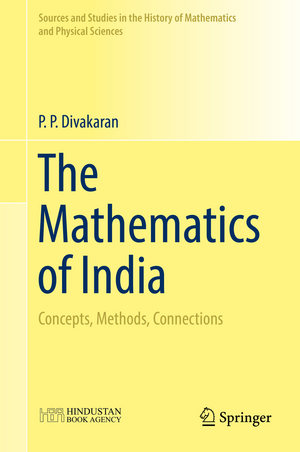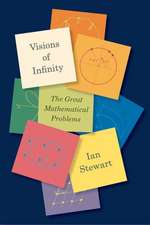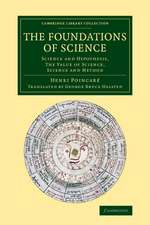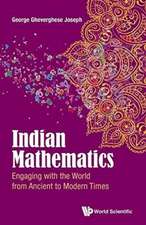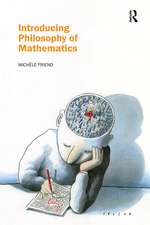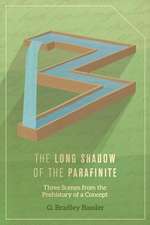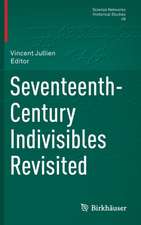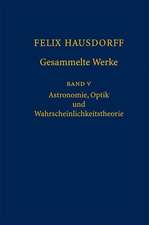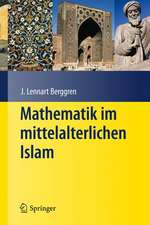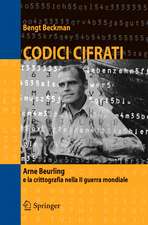The Mathematics of India: Concepts, Methods, Connections: Sources and Studies in the History of Mathematics and Physical Sciences
Autor P. P. Divakaranen Limba Engleză Hardback – 8 oct 2018
| Toate formatele și edițiile | Preț | Express |
|---|---|---|
| Paperback (1) | 514.08 lei 38-44 zile | |
| Springer Nature Singapore – 16 dec 2018 | 514.08 lei 38-44 zile | |
| Hardback (1) | 756.13 lei 3-5 săpt. | +32.72 lei 4-10 zile |
| Springer Nature Singapore – 8 oct 2018 | 756.13 lei 3-5 săpt. | +32.72 lei 4-10 zile |
Din seria Sources and Studies in the History of Mathematics and Physical Sciences
- 18%
 Preț: 907.11 lei
Preț: 907.11 lei - 15%
 Preț: 667.86 lei
Preț: 667.86 lei - 18%
 Preț: 1434.29 lei
Preț: 1434.29 lei -
 Preț: 387.75 lei
Preț: 387.75 lei - 15%
 Preț: 638.57 lei
Preț: 638.57 lei - 18%
 Preț: 896.70 lei
Preț: 896.70 lei - 15%
 Preț: 643.65 lei
Preț: 643.65 lei - 18%
 Preț: 916.25 lei
Preț: 916.25 lei - 18%
 Preț: 1124.92 lei
Preț: 1124.92 lei - 18%
 Preț: 963.29 lei
Preț: 963.29 lei - 15%
 Preț: 652.31 lei
Preț: 652.31 lei - 18%
 Preț: 1244.89 lei
Preț: 1244.89 lei - 23%
 Preț: 636.84 lei
Preț: 636.84 lei - 15%
 Preț: 649.71 lei
Preț: 649.71 lei -
 Preț: 390.25 lei
Preț: 390.25 lei - 15%
 Preț: 644.18 lei
Preț: 644.18 lei - 15%
 Preț: 580.17 lei
Preț: 580.17 lei - 18%
 Preț: 1123.35 lei
Preț: 1123.35 lei - 15%
 Preț: 641.03 lei
Preț: 641.03 lei - 15%
 Preț: 581.14 lei
Preț: 581.14 lei - 18%
 Preț: 796.31 lei
Preț: 796.31 lei - 18%
 Preț: 2119.49 lei
Preț: 2119.49 lei - 24%
 Preț: 860.16 lei
Preț: 860.16 lei - 15%
 Preț: 645.14 lei
Preț: 645.14 lei -
 Preț: 384.48 lei
Preț: 384.48 lei - 18%
 Preț: 1410.63 lei
Preț: 1410.63 lei - 18%
 Preț: 969.28 lei
Preț: 969.28 lei - 15%
 Preț: 642.03 lei
Preț: 642.03 lei - 18%
 Preț: 1113.71 lei
Preț: 1113.71 lei - 15%
 Preț: 662.16 lei
Preț: 662.16 lei - 18%
 Preț: 963.29 lei
Preț: 963.29 lei - 15%
 Preț: 647.59 lei
Preț: 647.59 lei -
 Preț: 395.63 lei
Preț: 395.63 lei - 18%
 Preț: 941.50 lei
Preț: 941.50 lei - 15%
 Preț: 709.56 lei
Preț: 709.56 lei - 18%
 Preț: 901.26 lei
Preț: 901.26 lei - 15%
 Preț: 695.53 lei
Preț: 695.53 lei - 24%
 Preț: 1244.50 lei
Preț: 1244.50 lei
Preț: 756.13 lei
Preț vechi: 945.16 lei
-20% Nou
Puncte Express: 1134
Preț estimativ în valută:
144.72€ • 149.14$ • 122.18£
144.72€ • 149.14$ • 122.18£
Carte disponibilă
Livrare economică 11-25 februarie
Livrare express 25-31 ianuarie pentru 42.71 lei
Preluare comenzi: 021 569.72.76
Specificații
ISBN-13: 9789811317736
ISBN-10: 9811317739
Pagini: 444
Ilustrații: XI, 441 p.
Dimensiuni: 155 x 235 x 30 mm
Greutate: 0.81 kg
Ediția:1st ed. 2018
Editura: Springer Nature Singapore
Colecția Springer
Seria Sources and Studies in the History of Mathematics and Physical Sciences
Locul publicării:Singapore, Singapore
ISBN-10: 9811317739
Pagini: 444
Ilustrații: XI, 441 p.
Dimensiuni: 155 x 235 x 30 mm
Greutate: 0.81 kg
Ediția:1st ed. 2018
Editura: Springer Nature Singapore
Colecția Springer
Seria Sources and Studies in the History of Mathematics and Physical Sciences
Locul publicării:Singapore, Singapore
Cuprins
Chapter 1. Background: Culture and Language.- Chapter 2. Vedic Geometry.- Chapter 3. Antecedents? Mathematics in the Indus Valley.- Chapter 4. Decimal Numbers.- Chapter 5. Numbers in the Vedic Literature.- Chapter 6. From 500 BCE to 500 CE.- Chapter 7. The Mathematics of the Ganitapada.- Chapter 8. From Brahmagupta to Bhaskara II to Narayana.- Chapter 9. The Nila Phenomenon.- Chapter 10. Nila Mathematics (General Survey).- Chapter 11. The pi-series.- Chapter 12. The Sine and Cosine Series.- Chapter 13. The pi-Series Revisited: Algebra in Analysis.- Chapter 14. What is Indian about the Mathematics of India?.- Chapter 15. What is Indian . . .? The Question of Proofs.- Chapter 16. Upasamhara.
Recenzii
“This is a very well-written account of the mathematics of India. There is a strong need for further research to fill the gaps that exist in the history of mathematics of India, and I think the current book serves to inspire the younger generation to undertake such an effort.” (Gnana B. Tenali, Mathematical Reviews, March 2, 2020)
Notă biografică
P.P. DIVAKARAN retired as professor from the Tata Institute of Fundamental Research, Mumbai in 1996. Subsequently, he has spent time at several institutions as adjunct or visiting professor. The present book grew out of research done at the Inter-University Centre for Astronomy and Astrophysics, Pune, as the holder of a Senior Award of the Homi Bhabha Fellowships Council.
Textul de pe ultima copertă
This book identifies three of the exceptionally fruitful periods of the millennia-long history of the mathematical tradition of India: the very beginning of that tradition in the construction of the now-universal system of decimal numeration and of a framework for planar geometry; a classical period inaugurated by Aryabhata’s invention of trigonometry and his enunciation of the principles of discrete calculus as applied to trigonometric functions; and a final phase that produced, in the work of Madhava, a rigorous infinitesimal calculus of such functions. The main highlight of this book is a detailed examination of these critical phases and their interconnectedness, primarily in mathematical terms but also in relation to their intellectual, cultural and historical contexts.
Recent decades have seen a renewal of interest in this history, as manifested in the publication of an increasing number of critical editions and translations of texts, as well as in an informed analytic interpretation of their content by the scholarly community. The result has been the emergence of a more accurate and balanced view of the subject, and the book has attempted to take an account of these nascent insights. As part of an endeavour to promote the new awareness, a special attention has been given to the presentation of proofs of all significant propositions in modern terminology and notation, either directly transcribed from the original texts or by collecting together material from several texts.
Caracteristici
Highlights the exceptionally fruitful periods of the millennia-long history of the mathematical tradition of India Discusses about the period of the construction of the now-universal system of decimal numeration and of a framework for planar geometry Reviews about about the classical period inaugurated by Aryabhata’s invention of trigonometry and the principles of discrete calculus Talks about the phase of Madhava, which produced a rigorous infinitesimal calculus of such functions
